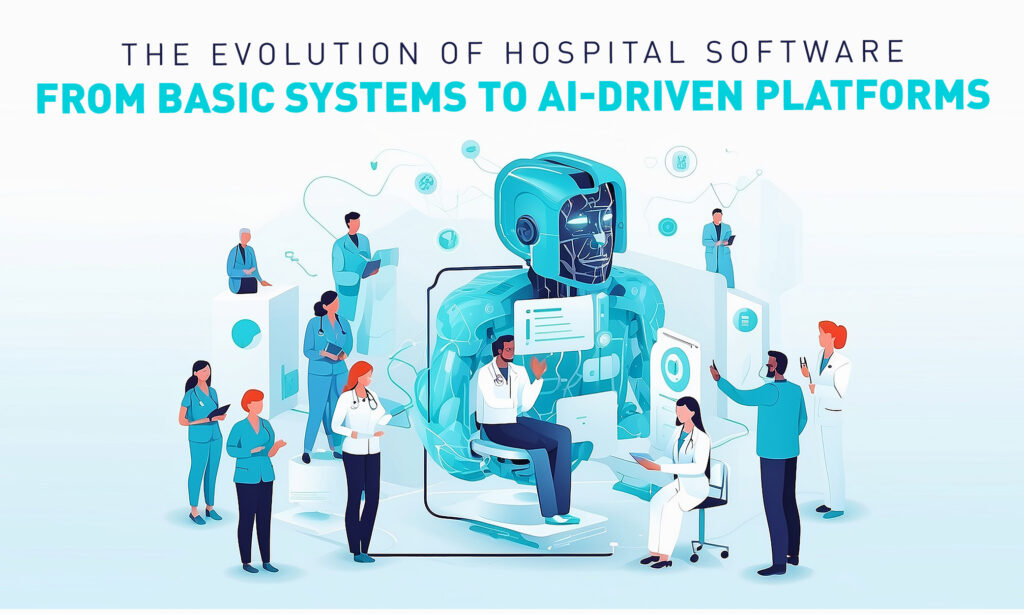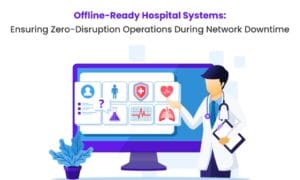
The landscape of healthcare has seen significant transformations, particularly with the integration of Artificial Intelligence (AI). What began as basic hospital management systems focused on administrative tasks has evolved into sophisticated AI-driven platforms that revolutionize patient care and operational efficiency. This post explores the journey from traditional systems to AI-based solutions, highlighting the impact on healthcare delivery.
The Role of AI in Hospital Management Systems
AI’s integration into hospital management systems has redefined how hospitals operate. Beyond mere data entry and patient record management, AI now enhances decision-making processes, optimizes resource allocation, and predicts patient outcomes. Hospitals utilize AI to streamline workflows, reduce administrative burdens, and improve the overall patient experience. AI-driven systems can predict staffing needs, manage inventory, and even assist in diagnostic processes, ensuring that healthcare providers can focus more on patient care than on administrative tasks.
Traditional Healthcare vs. AI-Based Healthcare
The shift from traditional healthcare systems to AI-based platforms marks a significant leap in efficiency and patient outcomes. Traditional systems, while functional, often rely heavily on manual processes, leading to delays and errors. AI-based healthcare, on the other hand, offers automation, precision, and predictive analytics. These systems can analyze vast amounts of data at the current time, providing previously unattainable insights. This evolution not only reduces the margin of error but also enhances the speed and accuracy of diagnoses and treatments.

Personalized Patient Care:
AI makes healthcare more personal by crafting treatment plans that fit each patient’s unique needs, ensuring they get the best care possible.
Cutting Costs:
By automating tasks and streamlining processes, AI helps reduce costs, making healthcare more affordable for everyone.
Smart Resource Management:
AI predicts what’s needed and when, so hospitals can use their staff and equipment more efficiently, reducing waste and wait times.
Stay Ahead of Health Issues:
With AI’s predictive power, healthcare providers can catch potential problems early, leading to faster treatments and better outcomes.
Boosted Patient Engagement:
AI keeps patients more involved in their care with personalized reminders, health tips, and easy access to at the current time support.
Spotlight on ROBODOC- AI-driven healthcare systems at Agent Hospital, China
Agent Hospital, the world’s first AI based hospital which will be handled by ROBO-DOCs, has opened its doors in China, marking an innovative moment in healthcare. This revolutionary facility leverages the power of artificial intelligence to transform patient care, offering 24/7 virtual consultations with AI-powered doctors. Patients can receive accurate diagnoses and personalized treatment plans without the need for in-person visits, thanks to advanced diagnostic tools and on time health monitoring. At Agent hospital the RoboDocs will going to be integrate with various health data sources, ensuring a comprehensive and coordinated approach to healthcare. This innovation not only enhances the efficiency of medical services but also makes quality healthcare more accessible to people everywhere.
Here are five main features of RoboDoc, the world’s first AI hospital with virtual doctors:
- Virtual Doctors: RoboDoc offers virtual consultations with AI-powered doctors who can diagnose and recommend treatments 24/7, making healthcare more accessible and convenient for patients.
- Advanced Diagnostics: The hospital is equipped with advanced AI technology that can analyse medical images, lab results, and patient histories with incredible precision, providing accurate diagnoses in record time.
- Current Time Monitoring: Patients can benefit from continuous on-time monitoring of vital signs and health metrics, allowing for immediate intervention if any abnormalities are detected.
- Personalized Treatment Plans: RoboDoc uses AI to create customized treatment plans for each patient, taking into account their unique medical history, lifestyle, and genetic data.
- Integration with Health Data: The hospital’s AI system integrates with various health data sources, including wearables and electronic health records, to provide a comprehensive overview of a patient’s health and ensure coordinated care.
How AI Helps Firms Achieve Optimal Results
AI’s impact extends beyond hospital operations into the broader healthcare industry. Firms utilizing AI technologies can achieve unprecedented levels of efficiency and innovation. AI helps in drug discovery, patient monitoring, and personalized treatment plans. By analyzing patient data, AI can identify patterns and suggest treatments tailored to individual patients, leading to better outcomes. Additionally, AI helps firms reduce costs by optimizing resource allocation and improving supply chain management, ensuring that they can deliver high-quality care at a lower cost.
The Future of Hospital Software: AI-Powered Hospital Software
Hospital Information Management Systems (HIMS) have already benefited from AI integration, but the future holds even greater potential. As AI technology continues to evolve, HIMS can become even more powerful, offering enhanced capabilities that go beyond current functionalities. In the future, AI could enable Hospital Software to predict and prevent equipment failures by analyzing usage patterns and maintenance records, ensuring that hospitals can avoid costly downtime. AI could also enhance patient engagement by providing personalized health recommendations based on recurrent data and patient history. By integrating AI-driven tools, hospital software can become a central hub for all hospital operations, making healthcare more efficient and patient-centered than ever before.

Ezovion and the Power of AI/ML Technology
Ezovion is at the forefront of integrating AI and Machine Learning (ML) technologies into healthcare systems. Their platform uses AI to provide actionable insights that improve patient care and operational efficiency. Ezovion’s AI/ML tools help in predictive analytics, automating routine tasks, and personalizing patient care. By leveraging AI/ML, Ezovion enables healthcare providers to make precise decisions based on data derived from AI that enhance patient outcomes and operations. This blend of AI and ML ensures that healthcare systems are not just reactive but proactive in managing patient care.
- 20x Faster End-to-End Diagnosis
- 100% Diagnostic Accuracy
- 25% Quicker Patient Recovery
- Flexible Deployment: On-Cloud or On-Premises
- 300% Cost Savings in Diagnosis & Treatment
- Reduces Radiology Workloads
- Quick Turnaround Time
- Clinically Validated
Discover our latest advancements in Hospital Software- Best Hospital Management System Software | Ezovion
Conclusion:
In conclusion, the evolution of hospital software from basic management systems to AI-driven platforms represents a monumental shift in healthcare. This transformation has redefined patient care, enhanced diagnostic accuracy, and streamlined hospital operations, making healthcare more efficient, personalized, and accessible. AI’s ability to analyze vast amounts of data in current times, predict outcomes, and automate routine tasks has not only improved the quality of care but also reduced costs and administrative burdens.
As we move forward, the integration of AI into Hospital Information Management Systems (HIMS) will continue to unlock new possibilities, making healthcare more proactive and patient-centered. With innovators like us leading the way, the future of healthcare is not just about managing patient records—it’s about revolutionizing the entire patient experience through intelligent, data-driven solutions.
Sources-





